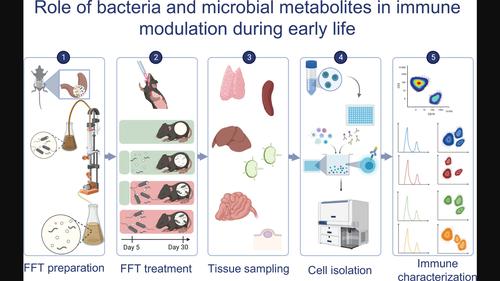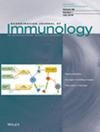Role of bacteria and microbial metabolites in immune modulation during early life
IF 4.1
4区 医学
Q2 IMMUNOLOGY
引用次数: 0
Abstract
Abstract Host–microbiome interplay from birth is essential for immune imprinting and tuning. Live gut microbes and microbial‐derived metabolites regulate the development and modulation of the immune system, but whether microbial metabolites solely are sufficient to induce immune maturation remains unclear. Sterile faecal filtrates (FFT) were generated from murine gut contents. Newborn germ‐free (GF) mice were treated twice daily with FFT (GF‐FFT) or saline (GF‐NaCl) from post‐natal day 5 until 4 weeks of age. A third group of GF neonates were conventionalized by the transfer of caecal microbiota with live gut microbes. Host immune compartments were comprehensively immunophenotyped and systemically analysed in all available immune‐related organs using flow cytometry. Oral FFT was associated with reduced survival among neonates (n = 7/19; 36.8% mortality), while saline treatment was well tolerated (n = 1/17, 5.9% mortality). Four‐week‐old FFT‐treated pups were comparable in body weight to GF‐NaCl, and the major B‐cell, conventional T‐cell and unconventional T‐cell subsets were unchanged from saline‐treated mice. Live bacteria administered during early life induced clear changes in proportions of B cells, T cells and T‐cell subsets in all mucosal tissues and secondary lymphoid organs compared to GF‐FFT, including restoration of intestinal natural killer T (NKT) cells with characteristics similar to conventional pups. Our findings show that oral administration of a FFT made of microbial metabolites, antigens and bacteriophages alone is insufficient to induce normal immune development elicited by the presence of live bacteria. Reduced survival during neonatal FFT treatment suggests a potential bioactive attribute of sterile faecal filtrates.

细菌和微生物代谢物在生命早期免疫调节中的作用
从出生开始,宿主-微生物组的相互作用对免疫印迹和调节至关重要。活的肠道微生物和微生物衍生的代谢物调节免疫系统的发育和调节,但微生物代谢物是否足以诱导免疫成熟尚不清楚。无菌粪便滤液(FFT)由小鼠肠道内容物产生。从出生后第5天至4周龄,新生无胚(GF)小鼠每天接受2次FFT (GF - FFT)或生理盐水(GF - NaCl)治疗。第三组GF新生儿通过将盲肠微生物群与活肠道微生物转移进行常规化。利用流式细胞术对所有可用的免疫相关器官的宿主免疫区室进行了全面的免疫表型分析和系统分析。口服FFT与新生儿生存率降低相关(n = 7/19;36.8%死亡率),而生理盐水治疗耐受性良好(n = 1/17, 5.9%死亡率)。4周大的FFT处理幼崽的体重与GF - NaCl相当,并且主要的B细胞、常规T细胞和非常规T细胞亚群与盐水处理小鼠没有变化。与GF - FFT相比,早期给药的活菌诱导了所有粘膜组织和次级淋巴器官中B细胞、T细胞和T细胞亚群比例的明显变化,包括肠道自然杀伤T (NKT)细胞的恢复,其特征与传统幼犬相似。我们的研究结果表明,单独口服由微生物代谢物、抗原和噬菌体组成的FFT不足以诱导活细菌存在引发的正常免疫发育。新生儿FFT治疗期间存活率降低表明无菌粪便滤液具有潜在的生物活性。
本文章由计算机程序翻译,如有差异,请以英文原文为准。
求助全文
约1分钟内获得全文
求助全文
来源期刊
CiteScore
7.70
自引率
5.40%
发文量
109
审稿时长
1 months
期刊介绍:
This peer-reviewed international journal publishes original articles and reviews on all aspects of basic, translational and clinical immunology. The journal aims to provide high quality service to authors, and high quality articles for readers.
The journal accepts for publication material from investigators all over the world, which makes a significant contribution to basic, translational and clinical immunology.

 求助内容:
求助内容: 应助结果提醒方式:
应助结果提醒方式:


